Assignment | intensified debates regarding Brexit
VerifiedAdded on 2022/10/09
|15
|4546
|17
Assignment
AI Summary
last order was TMP therefore created fresh order
Contribute Materials
Your contribution can guide someone’s learning journey. Share your
documents today.
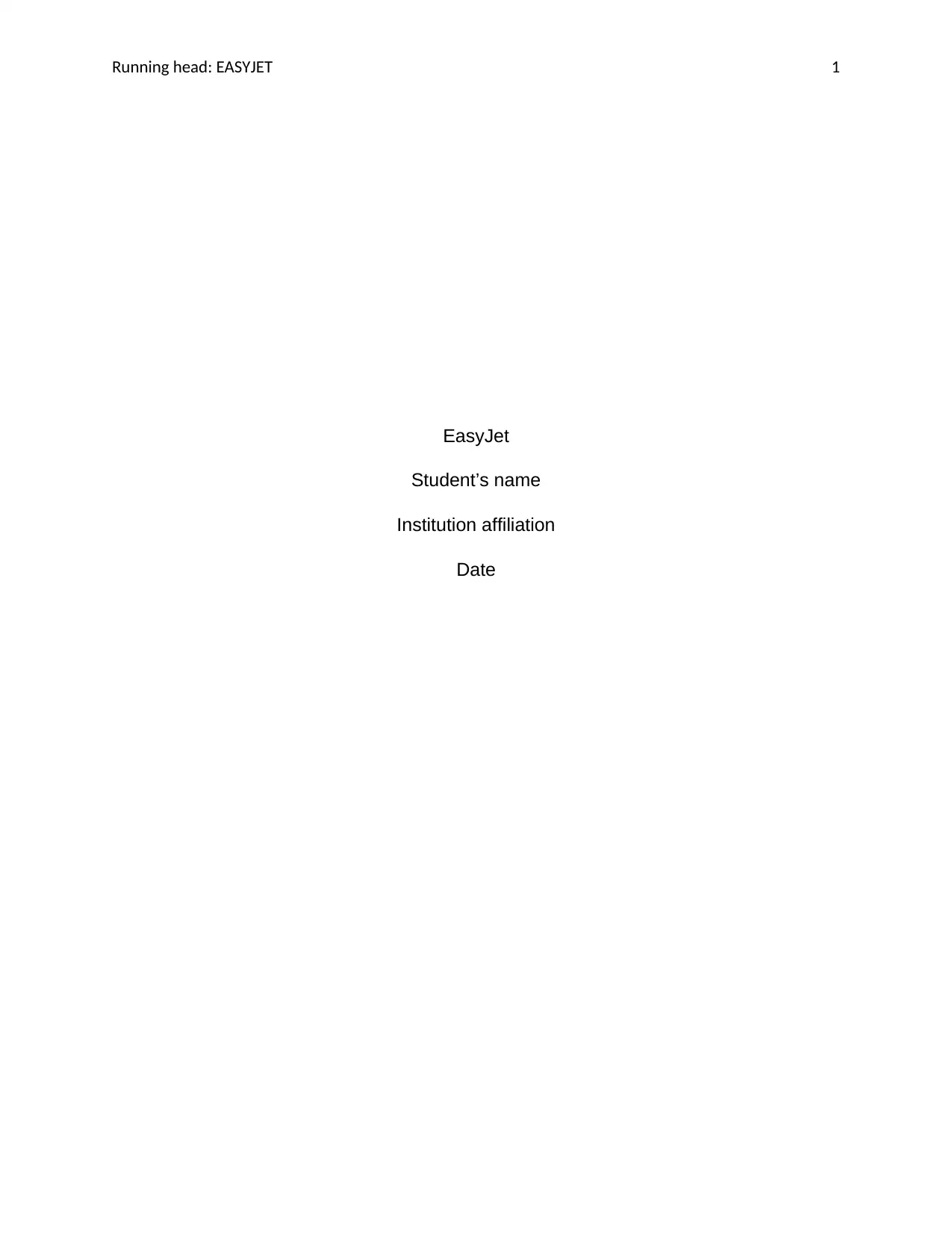
Running head: EASYJET 1
EasyJet
Student’s name
Institution affiliation
Date
EasyJet
Student’s name
Institution affiliation
Date
Secure Best Marks with AI Grader
Need help grading? Try our AI Grader for instant feedback on your assignments.

EASYJET 2
Abstract
With the intensified debates regarding Brexit, it is obvious that it will have positive and
negative impacts. The report discusses the terms of Hard Brexit, how economic
integration is staged, the impact of Brexit on third world countries. It also highlights how
Brexit will impact on the airline industry and specifically on easyJet.
Abstract
With the intensified debates regarding Brexit, it is obvious that it will have positive and
negative impacts. The report discusses the terms of Hard Brexit, how economic
integration is staged, the impact of Brexit on third world countries. It also highlights how
Brexit will impact on the airline industry and specifically on easyJet.
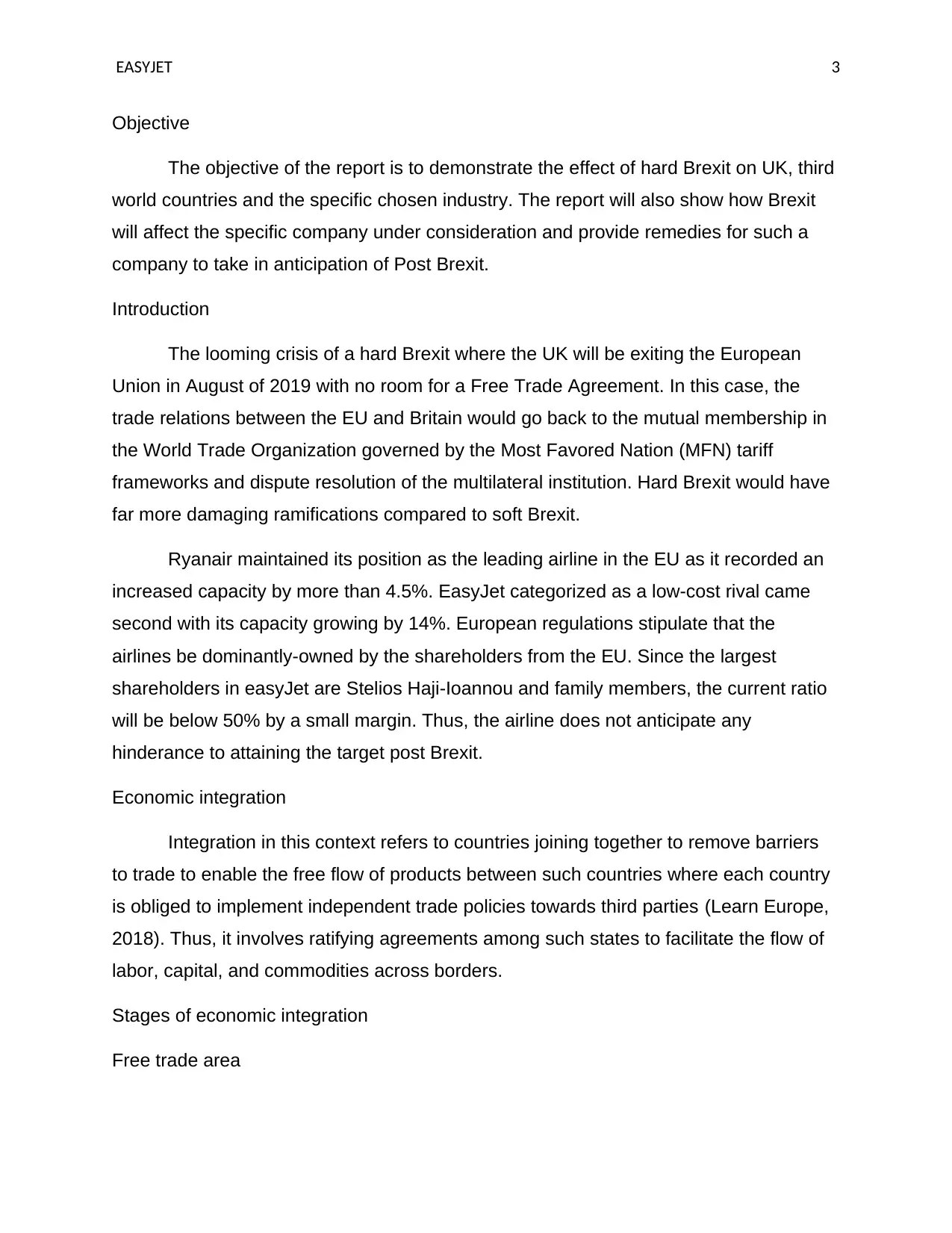
EASYJET 3
Objective
The objective of the report is to demonstrate the effect of hard Brexit on UK, third
world countries and the specific chosen industry. The report will also show how Brexit
will affect the specific company under consideration and provide remedies for such a
company to take in anticipation of Post Brexit.
Introduction
The looming crisis of a hard Brexit where the UK will be exiting the European
Union in August of 2019 with no room for a Free Trade Agreement. In this case, the
trade relations between the EU and Britain would go back to the mutual membership in
the World Trade Organization governed by the Most Favored Nation (MFN) tariff
frameworks and dispute resolution of the multilateral institution. Hard Brexit would have
far more damaging ramifications compared to soft Brexit.
Ryanair maintained its position as the leading airline in the EU as it recorded an
increased capacity by more than 4.5%. EasyJet categorized as a low-cost rival came
second with its capacity growing by 14%. European regulations stipulate that the
airlines be dominantly-owned by the shareholders from the EU. Since the largest
shareholders in easyJet are Stelios Haji-Ioannou and family members, the current ratio
will be below 50% by a small margin. Thus, the airline does not anticipate any
hinderance to attaining the target post Brexit.
Economic integration
Integration in this context refers to countries joining together to remove barriers
to trade to enable the free flow of products between such countries where each country
is obliged to implement independent trade policies towards third parties (Learn Europe,
2018). Thus, it involves ratifying agreements among such states to facilitate the flow of
labor, capital, and commodities across borders.
Stages of economic integration
Free trade area
Objective
The objective of the report is to demonstrate the effect of hard Brexit on UK, third
world countries and the specific chosen industry. The report will also show how Brexit
will affect the specific company under consideration and provide remedies for such a
company to take in anticipation of Post Brexit.
Introduction
The looming crisis of a hard Brexit where the UK will be exiting the European
Union in August of 2019 with no room for a Free Trade Agreement. In this case, the
trade relations between the EU and Britain would go back to the mutual membership in
the World Trade Organization governed by the Most Favored Nation (MFN) tariff
frameworks and dispute resolution of the multilateral institution. Hard Brexit would have
far more damaging ramifications compared to soft Brexit.
Ryanair maintained its position as the leading airline in the EU as it recorded an
increased capacity by more than 4.5%. EasyJet categorized as a low-cost rival came
second with its capacity growing by 14%. European regulations stipulate that the
airlines be dominantly-owned by the shareholders from the EU. Since the largest
shareholders in easyJet are Stelios Haji-Ioannou and family members, the current ratio
will be below 50% by a small margin. Thus, the airline does not anticipate any
hinderance to attaining the target post Brexit.
Economic integration
Integration in this context refers to countries joining together to remove barriers
to trade to enable the free flow of products between such countries where each country
is obliged to implement independent trade policies towards third parties (Learn Europe,
2018). Thus, it involves ratifying agreements among such states to facilitate the flow of
labor, capital, and commodities across borders.
Stages of economic integration
Free trade area
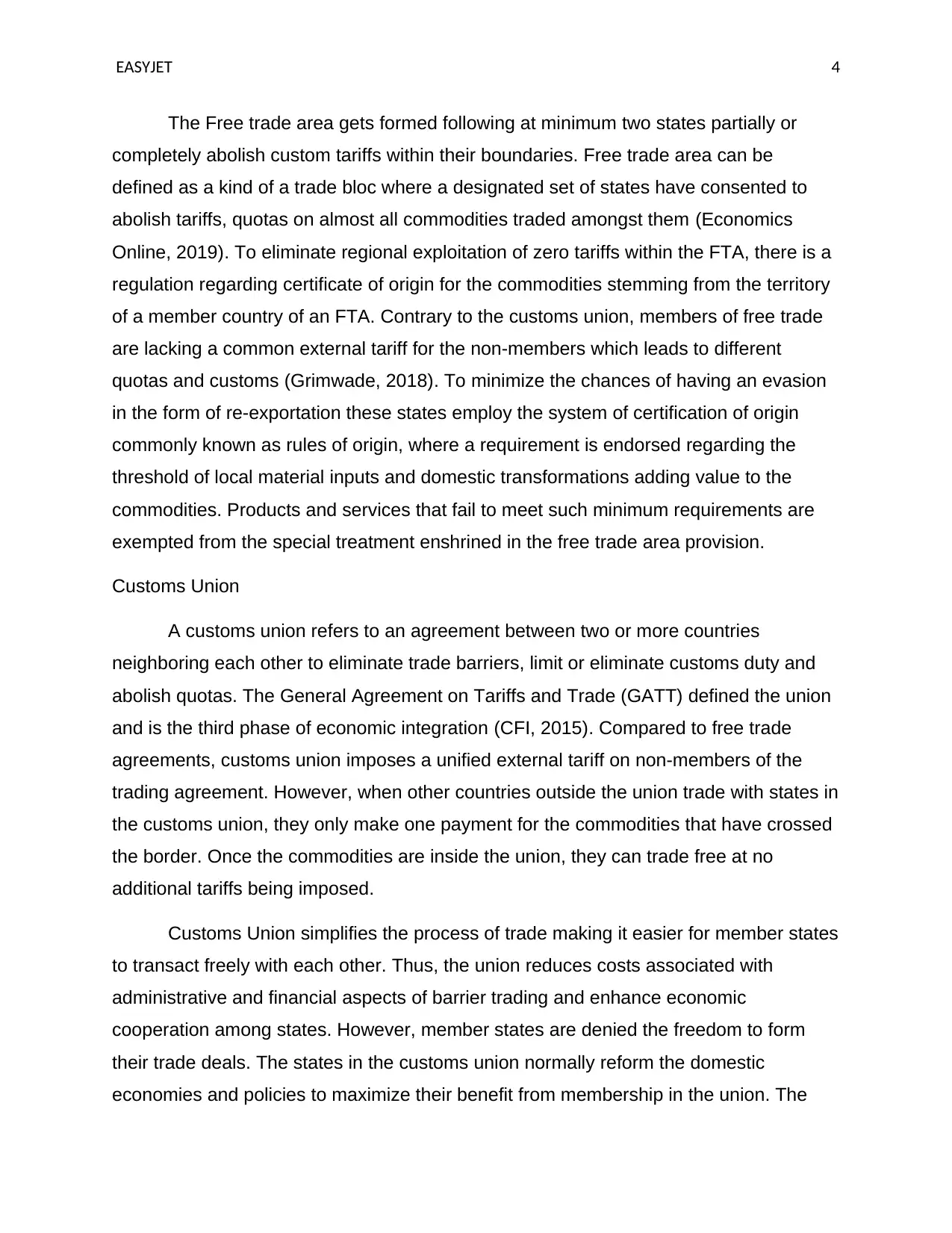
EASYJET 4
The Free trade area gets formed following at minimum two states partially or
completely abolish custom tariffs within their boundaries. Free trade area can be
defined as a kind of a trade bloc where a designated set of states have consented to
abolish tariffs, quotas on almost all commodities traded amongst them (Economics
Online, 2019). To eliminate regional exploitation of zero tariffs within the FTA, there is a
regulation regarding certificate of origin for the commodities stemming from the territory
of a member country of an FTA. Contrary to the customs union, members of free trade
are lacking a common external tariff for the non-members which leads to different
quotas and customs (Grimwade, 2018). To minimize the chances of having an evasion
in the form of re-exportation these states employ the system of certification of origin
commonly known as rules of origin, where a requirement is endorsed regarding the
threshold of local material inputs and domestic transformations adding value to the
commodities. Products and services that fail to meet such minimum requirements are
exempted from the special treatment enshrined in the free trade area provision.
Customs Union
A customs union refers to an agreement between two or more countries
neighboring each other to eliminate trade barriers, limit or eliminate customs duty and
abolish quotas. The General Agreement on Tariffs and Trade (GATT) defined the union
and is the third phase of economic integration (CFI, 2015). Compared to free trade
agreements, customs union imposes a unified external tariff on non-members of the
trading agreement. However, when other countries outside the union trade with states in
the customs union, they only make one payment for the commodities that have crossed
the border. Once the commodities are inside the union, they can trade free at no
additional tariffs being imposed.
Customs Union simplifies the process of trade making it easier for member states
to transact freely with each other. Thus, the union reduces costs associated with
administrative and financial aspects of barrier trading and enhance economic
cooperation among states. However, member states are denied the freedom to form
their trade deals. The states in the customs union normally reform the domestic
economies and policies to maximize their benefit from membership in the union. The
The Free trade area gets formed following at minimum two states partially or
completely abolish custom tariffs within their boundaries. Free trade area can be
defined as a kind of a trade bloc where a designated set of states have consented to
abolish tariffs, quotas on almost all commodities traded amongst them (Economics
Online, 2019). To eliminate regional exploitation of zero tariffs within the FTA, there is a
regulation regarding certificate of origin for the commodities stemming from the territory
of a member country of an FTA. Contrary to the customs union, members of free trade
are lacking a common external tariff for the non-members which leads to different
quotas and customs (Grimwade, 2018). To minimize the chances of having an evasion
in the form of re-exportation these states employ the system of certification of origin
commonly known as rules of origin, where a requirement is endorsed regarding the
threshold of local material inputs and domestic transformations adding value to the
commodities. Products and services that fail to meet such minimum requirements are
exempted from the special treatment enshrined in the free trade area provision.
Customs Union
A customs union refers to an agreement between two or more countries
neighboring each other to eliminate trade barriers, limit or eliminate customs duty and
abolish quotas. The General Agreement on Tariffs and Trade (GATT) defined the union
and is the third phase of economic integration (CFI, 2015). Compared to free trade
agreements, customs union imposes a unified external tariff on non-members of the
trading agreement. However, when other countries outside the union trade with states in
the customs union, they only make one payment for the commodities that have crossed
the border. Once the commodities are inside the union, they can trade free at no
additional tariffs being imposed.
Customs Union simplifies the process of trade making it easier for member states
to transact freely with each other. Thus, the union reduces costs associated with
administrative and financial aspects of barrier trading and enhance economic
cooperation among states. However, member states are denied the freedom to form
their trade deals. The states in the customs union normally reform the domestic
economies and policies to maximize their benefit from membership in the union. The
Secure Best Marks with AI Grader
Need help grading? Try our AI Grader for instant feedback on your assignments.
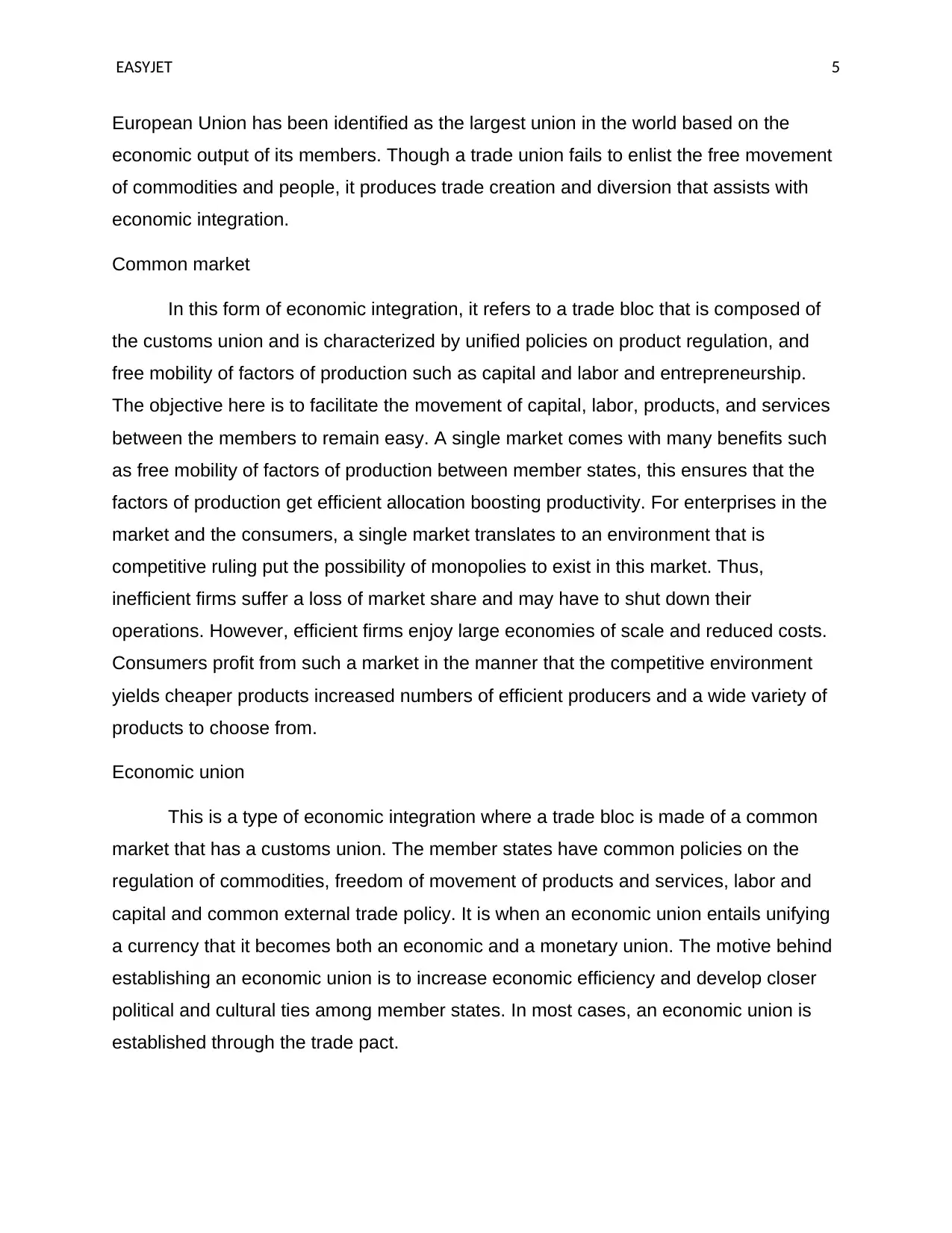
EASYJET 5
European Union has been identified as the largest union in the world based on the
economic output of its members. Though a trade union fails to enlist the free movement
of commodities and people, it produces trade creation and diversion that assists with
economic integration.
Common market
In this form of economic integration, it refers to a trade bloc that is composed of
the customs union and is characterized by unified policies on product regulation, and
free mobility of factors of production such as capital and labor and entrepreneurship.
The objective here is to facilitate the movement of capital, labor, products, and services
between the members to remain easy. A single market comes with many benefits such
as free mobility of factors of production between member states, this ensures that the
factors of production get efficient allocation boosting productivity. For enterprises in the
market and the consumers, a single market translates to an environment that is
competitive ruling put the possibility of monopolies to exist in this market. Thus,
inefficient firms suffer a loss of market share and may have to shut down their
operations. However, efficient firms enjoy large economies of scale and reduced costs.
Consumers profit from such a market in the manner that the competitive environment
yields cheaper products increased numbers of efficient producers and a wide variety of
products to choose from.
Economic union
This is a type of economic integration where a trade bloc is made of a common
market that has a customs union. The member states have common policies on the
regulation of commodities, freedom of movement of products and services, labor and
capital and common external trade policy. It is when an economic union entails unifying
a currency that it becomes both an economic and a monetary union. The motive behind
establishing an economic union is to increase economic efficiency and develop closer
political and cultural ties among member states. In most cases, an economic union is
established through the trade pact.
European Union has been identified as the largest union in the world based on the
economic output of its members. Though a trade union fails to enlist the free movement
of commodities and people, it produces trade creation and diversion that assists with
economic integration.
Common market
In this form of economic integration, it refers to a trade bloc that is composed of
the customs union and is characterized by unified policies on product regulation, and
free mobility of factors of production such as capital and labor and entrepreneurship.
The objective here is to facilitate the movement of capital, labor, products, and services
between the members to remain easy. A single market comes with many benefits such
as free mobility of factors of production between member states, this ensures that the
factors of production get efficient allocation boosting productivity. For enterprises in the
market and the consumers, a single market translates to an environment that is
competitive ruling put the possibility of monopolies to exist in this market. Thus,
inefficient firms suffer a loss of market share and may have to shut down their
operations. However, efficient firms enjoy large economies of scale and reduced costs.
Consumers profit from such a market in the manner that the competitive environment
yields cheaper products increased numbers of efficient producers and a wide variety of
products to choose from.
Economic union
This is a type of economic integration where a trade bloc is made of a common
market that has a customs union. The member states have common policies on the
regulation of commodities, freedom of movement of products and services, labor and
capital and common external trade policy. It is when an economic union entails unifying
a currency that it becomes both an economic and a monetary union. The motive behind
establishing an economic union is to increase economic efficiency and develop closer
political and cultural ties among member states. In most cases, an economic union is
established through the trade pact.
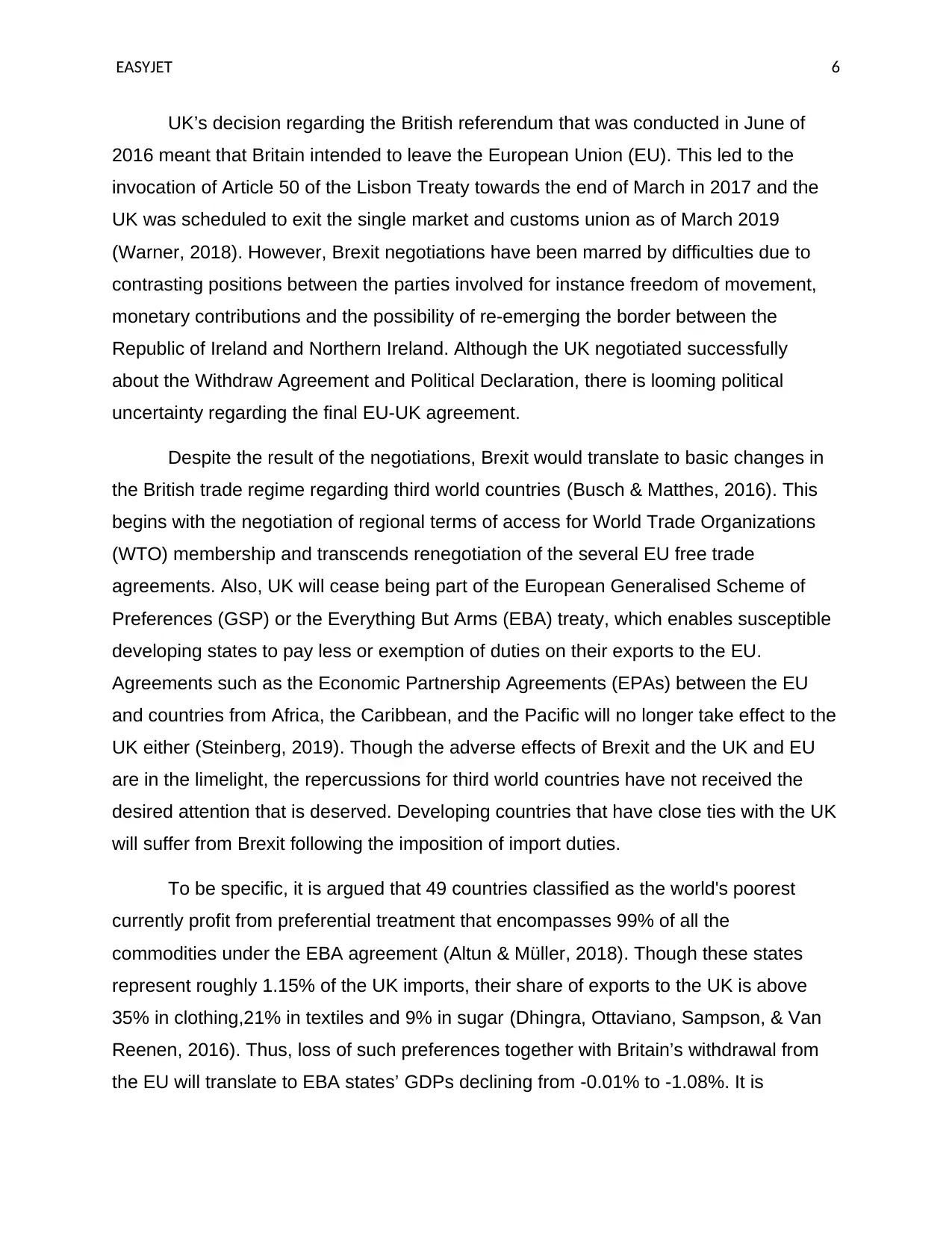
EASYJET 6
UK’s decision regarding the British referendum that was conducted in June of
2016 meant that Britain intended to leave the European Union (EU). This led to the
invocation of Article 50 of the Lisbon Treaty towards the end of March in 2017 and the
UK was scheduled to exit the single market and customs union as of March 2019
(Warner, 2018). However, Brexit negotiations have been marred by difficulties due to
contrasting positions between the parties involved for instance freedom of movement,
monetary contributions and the possibility of re-emerging the border between the
Republic of Ireland and Northern Ireland. Although the UK negotiated successfully
about the Withdraw Agreement and Political Declaration, there is looming political
uncertainty regarding the final EU-UK agreement.
Despite the result of the negotiations, Brexit would translate to basic changes in
the British trade regime regarding third world countries (Busch & Matthes, 2016). This
begins with the negotiation of regional terms of access for World Trade Organizations
(WTO) membership and transcends renegotiation of the several EU free trade
agreements. Also, UK will cease being part of the European Generalised Scheme of
Preferences (GSP) or the Everything But Arms (EBA) treaty, which enables susceptible
developing states to pay less or exemption of duties on their exports to the EU.
Agreements such as the Economic Partnership Agreements (EPAs) between the EU
and countries from Africa, the Caribbean, and the Pacific will no longer take effect to the
UK either (Steinberg, 2019). Though the adverse effects of Brexit and the UK and EU
are in the limelight, the repercussions for third world countries have not received the
desired attention that is deserved. Developing countries that have close ties with the UK
will suffer from Brexit following the imposition of import duties.
To be specific, it is argued that 49 countries classified as the world's poorest
currently profit from preferential treatment that encompasses 99% of all the
commodities under the EBA agreement (Altun & Müller, 2018). Though these states
represent roughly 1.15% of the UK imports, their share of exports to the UK is above
35% in clothing,21% in textiles and 9% in sugar (Dhingra, Ottaviano, Sampson, & Van
Reenen, 2016). Thus, loss of such preferences together with Britain’s withdrawal from
the EU will translate to EBA states’ GDPs declining from -0.01% to -1.08%. It is
UK’s decision regarding the British referendum that was conducted in June of
2016 meant that Britain intended to leave the European Union (EU). This led to the
invocation of Article 50 of the Lisbon Treaty towards the end of March in 2017 and the
UK was scheduled to exit the single market and customs union as of March 2019
(Warner, 2018). However, Brexit negotiations have been marred by difficulties due to
contrasting positions between the parties involved for instance freedom of movement,
monetary contributions and the possibility of re-emerging the border between the
Republic of Ireland and Northern Ireland. Although the UK negotiated successfully
about the Withdraw Agreement and Political Declaration, there is looming political
uncertainty regarding the final EU-UK agreement.
Despite the result of the negotiations, Brexit would translate to basic changes in
the British trade regime regarding third world countries (Busch & Matthes, 2016). This
begins with the negotiation of regional terms of access for World Trade Organizations
(WTO) membership and transcends renegotiation of the several EU free trade
agreements. Also, UK will cease being part of the European Generalised Scheme of
Preferences (GSP) or the Everything But Arms (EBA) treaty, which enables susceptible
developing states to pay less or exemption of duties on their exports to the EU.
Agreements such as the Economic Partnership Agreements (EPAs) between the EU
and countries from Africa, the Caribbean, and the Pacific will no longer take effect to the
UK either (Steinberg, 2019). Though the adverse effects of Brexit and the UK and EU
are in the limelight, the repercussions for third world countries have not received the
desired attention that is deserved. Developing countries that have close ties with the UK
will suffer from Brexit following the imposition of import duties.
To be specific, it is argued that 49 countries classified as the world's poorest
currently profit from preferential treatment that encompasses 99% of all the
commodities under the EBA agreement (Altun & Müller, 2018). Though these states
represent roughly 1.15% of the UK imports, their share of exports to the UK is above
35% in clothing,21% in textiles and 9% in sugar (Dhingra, Ottaviano, Sampson, & Van
Reenen, 2016). Thus, loss of such preferences together with Britain’s withdrawal from
the EU will translate to EBA states’ GDPs declining from -0.01% to -1.08%. It is
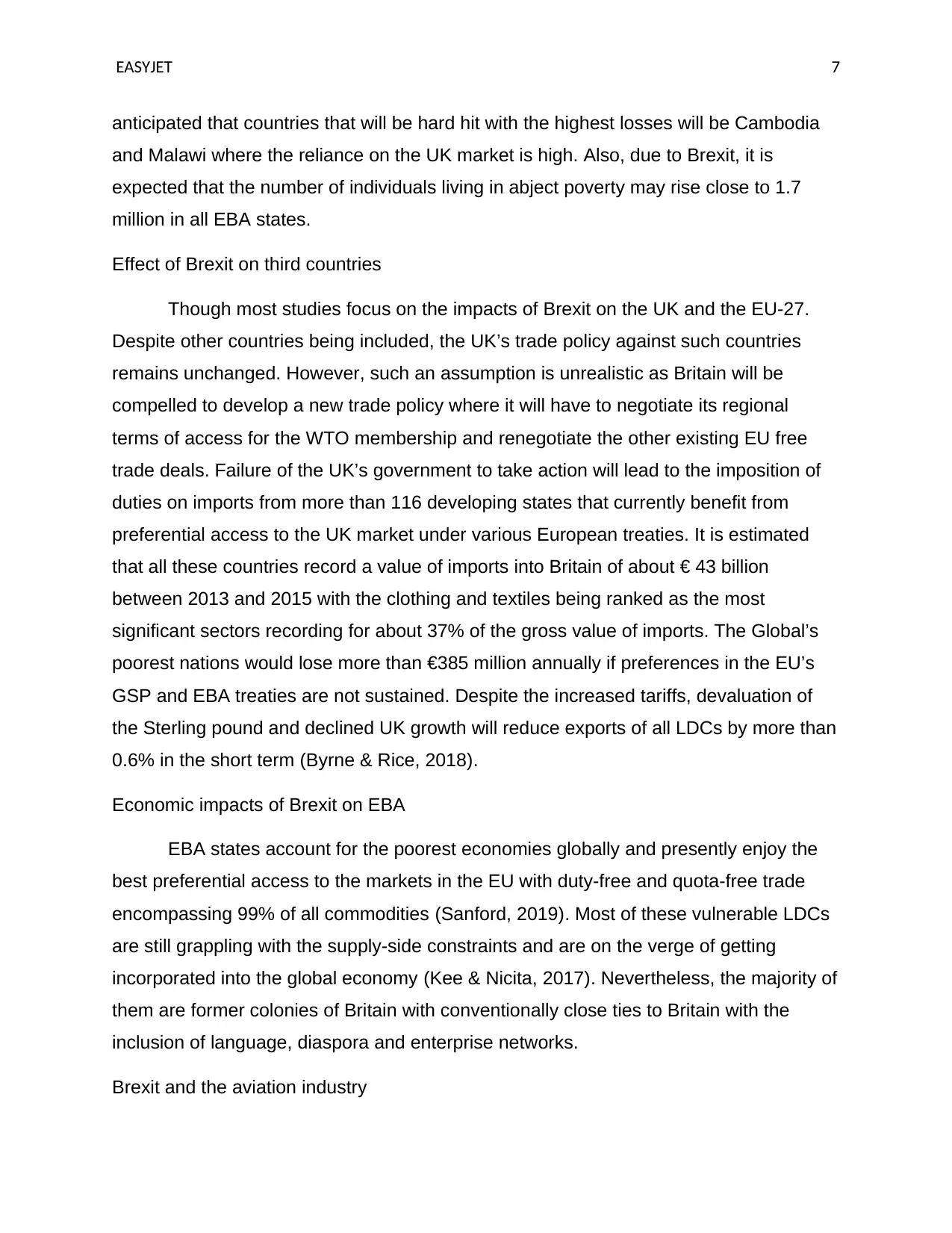
EASYJET 7
anticipated that countries that will be hard hit with the highest losses will be Cambodia
and Malawi where the reliance on the UK market is high. Also, due to Brexit, it is
expected that the number of individuals living in abject poverty may rise close to 1.7
million in all EBA states.
Effect of Brexit on third countries
Though most studies focus on the impacts of Brexit on the UK and the EU-27.
Despite other countries being included, the UK’s trade policy against such countries
remains unchanged. However, such an assumption is unrealistic as Britain will be
compelled to develop a new trade policy where it will have to negotiate its regional
terms of access for the WTO membership and renegotiate the other existing EU free
trade deals. Failure of the UK’s government to take action will lead to the imposition of
duties on imports from more than 116 developing states that currently benefit from
preferential access to the UK market under various European treaties. It is estimated
that all these countries record a value of imports into Britain of about € 43 billion
between 2013 and 2015 with the clothing and textiles being ranked as the most
significant sectors recording for about 37% of the gross value of imports. The Global’s
poorest nations would lose more than €385 million annually if preferences in the EU’s
GSP and EBA treaties are not sustained. Despite the increased tariffs, devaluation of
the Sterling pound and declined UK growth will reduce exports of all LDCs by more than
0.6% in the short term (Byrne & Rice, 2018).
Economic impacts of Brexit on EBA
EBA states account for the poorest economies globally and presently enjoy the
best preferential access to the markets in the EU with duty-free and quota-free trade
encompassing 99% of all commodities (Sanford, 2019). Most of these vulnerable LDCs
are still grappling with the supply-side constraints and are on the verge of getting
incorporated into the global economy (Kee & Nicita, 2017). Nevertheless, the majority of
them are former colonies of Britain with conventionally close ties to Britain with the
inclusion of language, diaspora and enterprise networks.
Brexit and the aviation industry
anticipated that countries that will be hard hit with the highest losses will be Cambodia
and Malawi where the reliance on the UK market is high. Also, due to Brexit, it is
expected that the number of individuals living in abject poverty may rise close to 1.7
million in all EBA states.
Effect of Brexit on third countries
Though most studies focus on the impacts of Brexit on the UK and the EU-27.
Despite other countries being included, the UK’s trade policy against such countries
remains unchanged. However, such an assumption is unrealistic as Britain will be
compelled to develop a new trade policy where it will have to negotiate its regional
terms of access for the WTO membership and renegotiate the other existing EU free
trade deals. Failure of the UK’s government to take action will lead to the imposition of
duties on imports from more than 116 developing states that currently benefit from
preferential access to the UK market under various European treaties. It is estimated
that all these countries record a value of imports into Britain of about € 43 billion
between 2013 and 2015 with the clothing and textiles being ranked as the most
significant sectors recording for about 37% of the gross value of imports. The Global’s
poorest nations would lose more than €385 million annually if preferences in the EU’s
GSP and EBA treaties are not sustained. Despite the increased tariffs, devaluation of
the Sterling pound and declined UK growth will reduce exports of all LDCs by more than
0.6% in the short term (Byrne & Rice, 2018).
Economic impacts of Brexit on EBA
EBA states account for the poorest economies globally and presently enjoy the
best preferential access to the markets in the EU with duty-free and quota-free trade
encompassing 99% of all commodities (Sanford, 2019). Most of these vulnerable LDCs
are still grappling with the supply-side constraints and are on the verge of getting
incorporated into the global economy (Kee & Nicita, 2017). Nevertheless, the majority of
them are former colonies of Britain with conventionally close ties to Britain with the
inclusion of language, diaspora and enterprise networks.
Brexit and the aviation industry
Paraphrase This Document
Need a fresh take? Get an instant paraphrase of this document with our AI Paraphraser
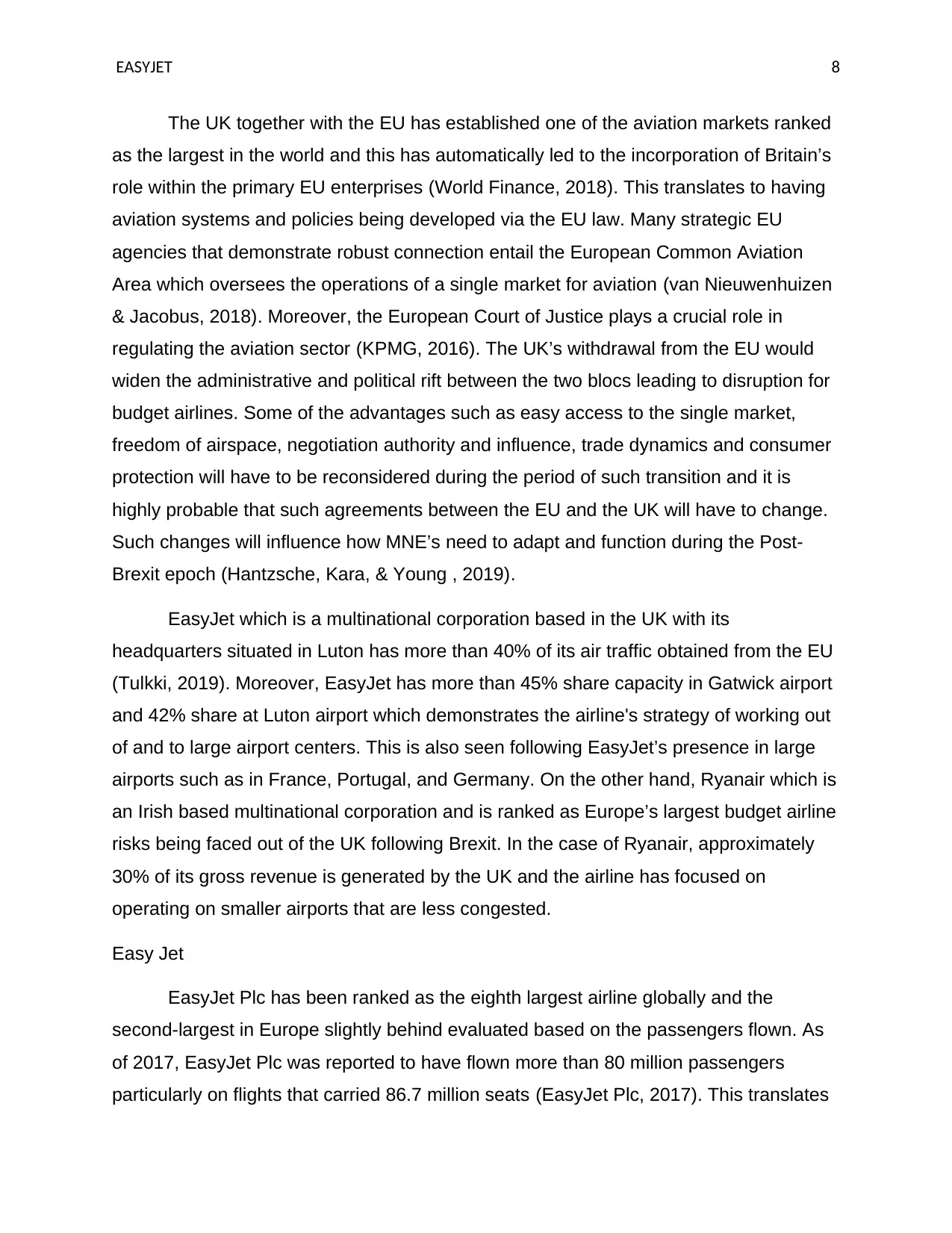
EASYJET 8
The UK together with the EU has established one of the aviation markets ranked
as the largest in the world and this has automatically led to the incorporation of Britain’s
role within the primary EU enterprises (World Finance, 2018). This translates to having
aviation systems and policies being developed via the EU law. Many strategic EU
agencies that demonstrate robust connection entail the European Common Aviation
Area which oversees the operations of a single market for aviation (van Nieuwenhuizen
& Jacobus, 2018). Moreover, the European Court of Justice plays a crucial role in
regulating the aviation sector (KPMG, 2016). The UK’s withdrawal from the EU would
widen the administrative and political rift between the two blocs leading to disruption for
budget airlines. Some of the advantages such as easy access to the single market,
freedom of airspace, negotiation authority and influence, trade dynamics and consumer
protection will have to be reconsidered during the period of such transition and it is
highly probable that such agreements between the EU and the UK will have to change.
Such changes will influence how MNE’s need to adapt and function during the Post-
Brexit epoch (Hantzsche, Kara, & Young , 2019).
EasyJet which is a multinational corporation based in the UK with its
headquarters situated in Luton has more than 40% of its air traffic obtained from the EU
(Tulkki, 2019). Moreover, EasyJet has more than 45% share capacity in Gatwick airport
and 42% share at Luton airport which demonstrates the airline's strategy of working out
of and to large airport centers. This is also seen following EasyJet’s presence in large
airports such as in France, Portugal, and Germany. On the other hand, Ryanair which is
an Irish based multinational corporation and is ranked as Europe’s largest budget airline
risks being faced out of the UK following Brexit. In the case of Ryanair, approximately
30% of its gross revenue is generated by the UK and the airline has focused on
operating on smaller airports that are less congested.
Easy Jet
EasyJet Plc has been ranked as the eighth largest airline globally and the
second-largest in Europe slightly behind evaluated based on the passengers flown. As
of 2017, EasyJet Plc was reported to have flown more than 80 million passengers
particularly on flights that carried 86.7 million seats (EasyJet Plc, 2017). This translates
The UK together with the EU has established one of the aviation markets ranked
as the largest in the world and this has automatically led to the incorporation of Britain’s
role within the primary EU enterprises (World Finance, 2018). This translates to having
aviation systems and policies being developed via the EU law. Many strategic EU
agencies that demonstrate robust connection entail the European Common Aviation
Area which oversees the operations of a single market for aviation (van Nieuwenhuizen
& Jacobus, 2018). Moreover, the European Court of Justice plays a crucial role in
regulating the aviation sector (KPMG, 2016). The UK’s withdrawal from the EU would
widen the administrative and political rift between the two blocs leading to disruption for
budget airlines. Some of the advantages such as easy access to the single market,
freedom of airspace, negotiation authority and influence, trade dynamics and consumer
protection will have to be reconsidered during the period of such transition and it is
highly probable that such agreements between the EU and the UK will have to change.
Such changes will influence how MNE’s need to adapt and function during the Post-
Brexit epoch (Hantzsche, Kara, & Young , 2019).
EasyJet which is a multinational corporation based in the UK with its
headquarters situated in Luton has more than 40% of its air traffic obtained from the EU
(Tulkki, 2019). Moreover, EasyJet has more than 45% share capacity in Gatwick airport
and 42% share at Luton airport which demonstrates the airline's strategy of working out
of and to large airport centers. This is also seen following EasyJet’s presence in large
airports such as in France, Portugal, and Germany. On the other hand, Ryanair which is
an Irish based multinational corporation and is ranked as Europe’s largest budget airline
risks being faced out of the UK following Brexit. In the case of Ryanair, approximately
30% of its gross revenue is generated by the UK and the airline has focused on
operating on smaller airports that are less congested.
Easy Jet
EasyJet Plc has been ranked as the eighth largest airline globally and the
second-largest in Europe slightly behind evaluated based on the passengers flown. As
of 2017, EasyJet Plc was reported to have flown more than 80 million passengers
particularly on flights that carried 86.7 million seats (EasyJet Plc, 2017). This translates
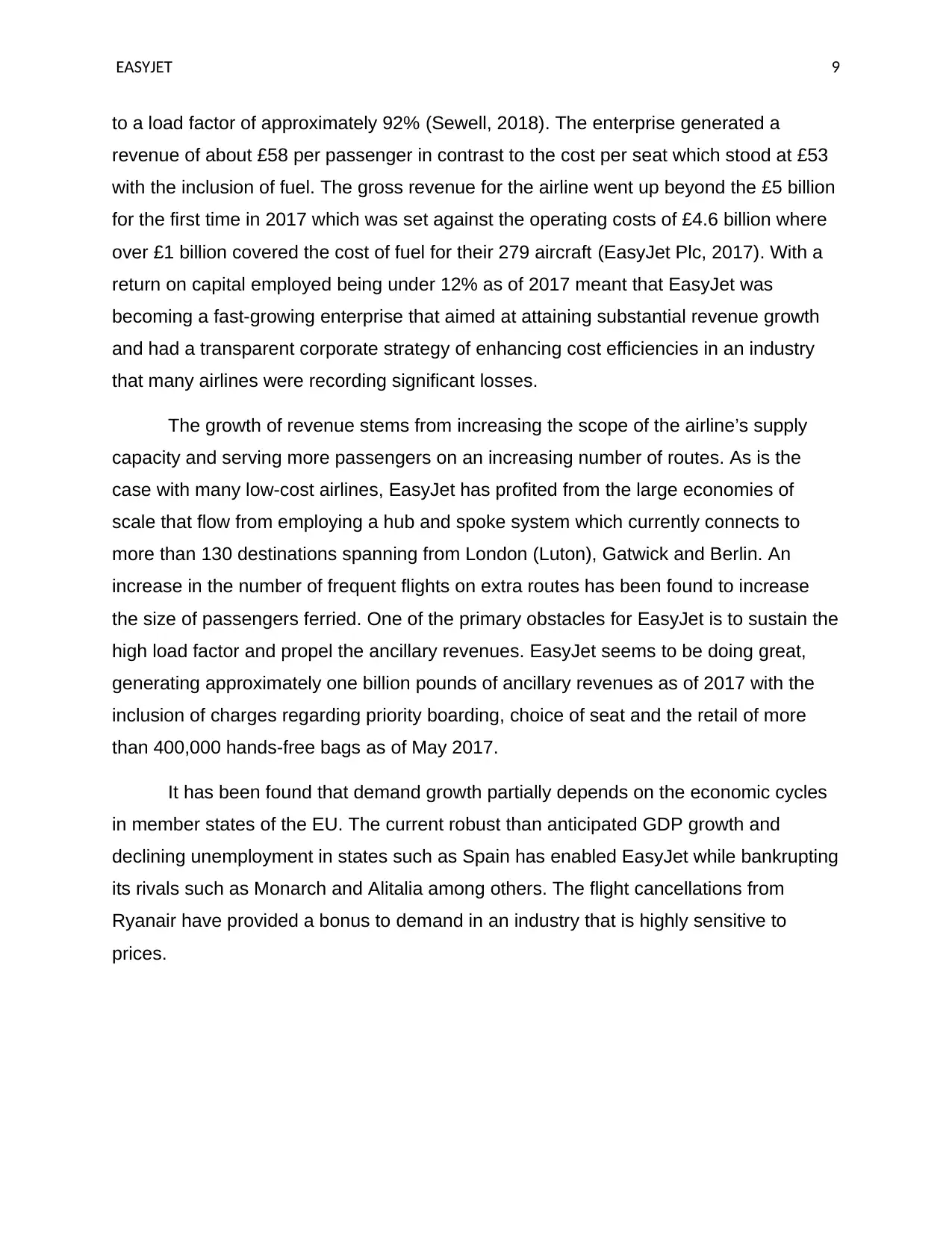
EASYJET 9
to a load factor of approximately 92% (Sewell, 2018). The enterprise generated a
revenue of about £58 per passenger in contrast to the cost per seat which stood at £53
with the inclusion of fuel. The gross revenue for the airline went up beyond the £5 billion
for the first time in 2017 which was set against the operating costs of £4.6 billion where
over £1 billion covered the cost of fuel for their 279 aircraft (EasyJet Plc, 2017). With a
return on capital employed being under 12% as of 2017 meant that EasyJet was
becoming a fast-growing enterprise that aimed at attaining substantial revenue growth
and had a transparent corporate strategy of enhancing cost efficiencies in an industry
that many airlines were recording significant losses.
The growth of revenue stems from increasing the scope of the airline’s supply
capacity and serving more passengers on an increasing number of routes. As is the
case with many low-cost airlines, EasyJet has profited from the large economies of
scale that flow from employing a hub and spoke system which currently connects to
more than 130 destinations spanning from London (Luton), Gatwick and Berlin. An
increase in the number of frequent flights on extra routes has been found to increase
the size of passengers ferried. One of the primary obstacles for EasyJet is to sustain the
high load factor and propel the ancillary revenues. EasyJet seems to be doing great,
generating approximately one billion pounds of ancillary revenues as of 2017 with the
inclusion of charges regarding priority boarding, choice of seat and the retail of more
than 400,000 hands-free bags as of May 2017.
It has been found that demand growth partially depends on the economic cycles
in member states of the EU. The current robust than anticipated GDP growth and
declining unemployment in states such as Spain has enabled EasyJet while bankrupting
its rivals such as Monarch and Alitalia among others. The flight cancellations from
Ryanair have provided a bonus to demand in an industry that is highly sensitive to
prices.
to a load factor of approximately 92% (Sewell, 2018). The enterprise generated a
revenue of about £58 per passenger in contrast to the cost per seat which stood at £53
with the inclusion of fuel. The gross revenue for the airline went up beyond the £5 billion
for the first time in 2017 which was set against the operating costs of £4.6 billion where
over £1 billion covered the cost of fuel for their 279 aircraft (EasyJet Plc, 2017). With a
return on capital employed being under 12% as of 2017 meant that EasyJet was
becoming a fast-growing enterprise that aimed at attaining substantial revenue growth
and had a transparent corporate strategy of enhancing cost efficiencies in an industry
that many airlines were recording significant losses.
The growth of revenue stems from increasing the scope of the airline’s supply
capacity and serving more passengers on an increasing number of routes. As is the
case with many low-cost airlines, EasyJet has profited from the large economies of
scale that flow from employing a hub and spoke system which currently connects to
more than 130 destinations spanning from London (Luton), Gatwick and Berlin. An
increase in the number of frequent flights on extra routes has been found to increase
the size of passengers ferried. One of the primary obstacles for EasyJet is to sustain the
high load factor and propel the ancillary revenues. EasyJet seems to be doing great,
generating approximately one billion pounds of ancillary revenues as of 2017 with the
inclusion of charges regarding priority boarding, choice of seat and the retail of more
than 400,000 hands-free bags as of May 2017.
It has been found that demand growth partially depends on the economic cycles
in member states of the EU. The current robust than anticipated GDP growth and
declining unemployment in states such as Spain has enabled EasyJet while bankrupting
its rivals such as Monarch and Alitalia among others. The flight cancellations from
Ryanair have provided a bonus to demand in an industry that is highly sensitive to
prices.
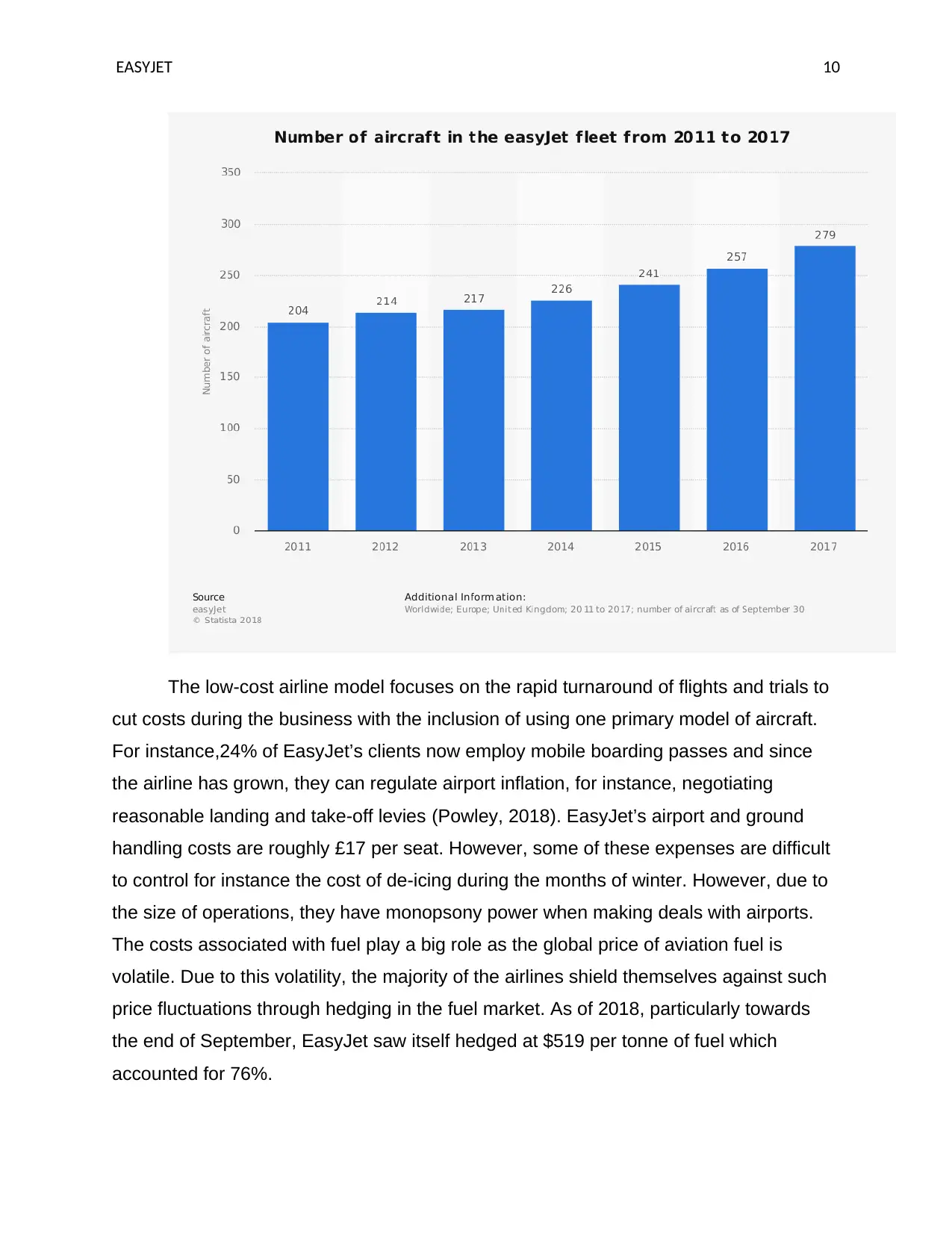
EASYJET 10
The low-cost airline model focuses on the rapid turnaround of flights and trials to
cut costs during the business with the inclusion of using one primary model of aircraft.
For instance,24% of EasyJet’s clients now employ mobile boarding passes and since
the airline has grown, they can regulate airport inflation, for instance, negotiating
reasonable landing and take-off levies (Powley, 2018). EasyJet’s airport and ground
handling costs are roughly £17 per seat. However, some of these expenses are difficult
to control for instance the cost of de-icing during the months of winter. However, due to
the size of operations, they have monopsony power when making deals with airports.
The costs associated with fuel play a big role as the global price of aviation fuel is
volatile. Due to this volatility, the majority of the airlines shield themselves against such
price fluctuations through hedging in the fuel market. As of 2018, particularly towards
the end of September, EasyJet saw itself hedged at $519 per tonne of fuel which
accounted for 76%.
The low-cost airline model focuses on the rapid turnaround of flights and trials to
cut costs during the business with the inclusion of using one primary model of aircraft.
For instance,24% of EasyJet’s clients now employ mobile boarding passes and since
the airline has grown, they can regulate airport inflation, for instance, negotiating
reasonable landing and take-off levies (Powley, 2018). EasyJet’s airport and ground
handling costs are roughly £17 per seat. However, some of these expenses are difficult
to control for instance the cost of de-icing during the months of winter. However, due to
the size of operations, they have monopsony power when making deals with airports.
The costs associated with fuel play a big role as the global price of aviation fuel is
volatile. Due to this volatility, the majority of the airlines shield themselves against such
price fluctuations through hedging in the fuel market. As of 2018, particularly towards
the end of September, EasyJet saw itself hedged at $519 per tonne of fuel which
accounted for 76%.
Secure Best Marks with AI Grader
Need help grading? Try our AI Grader for instant feedback on your assignments.
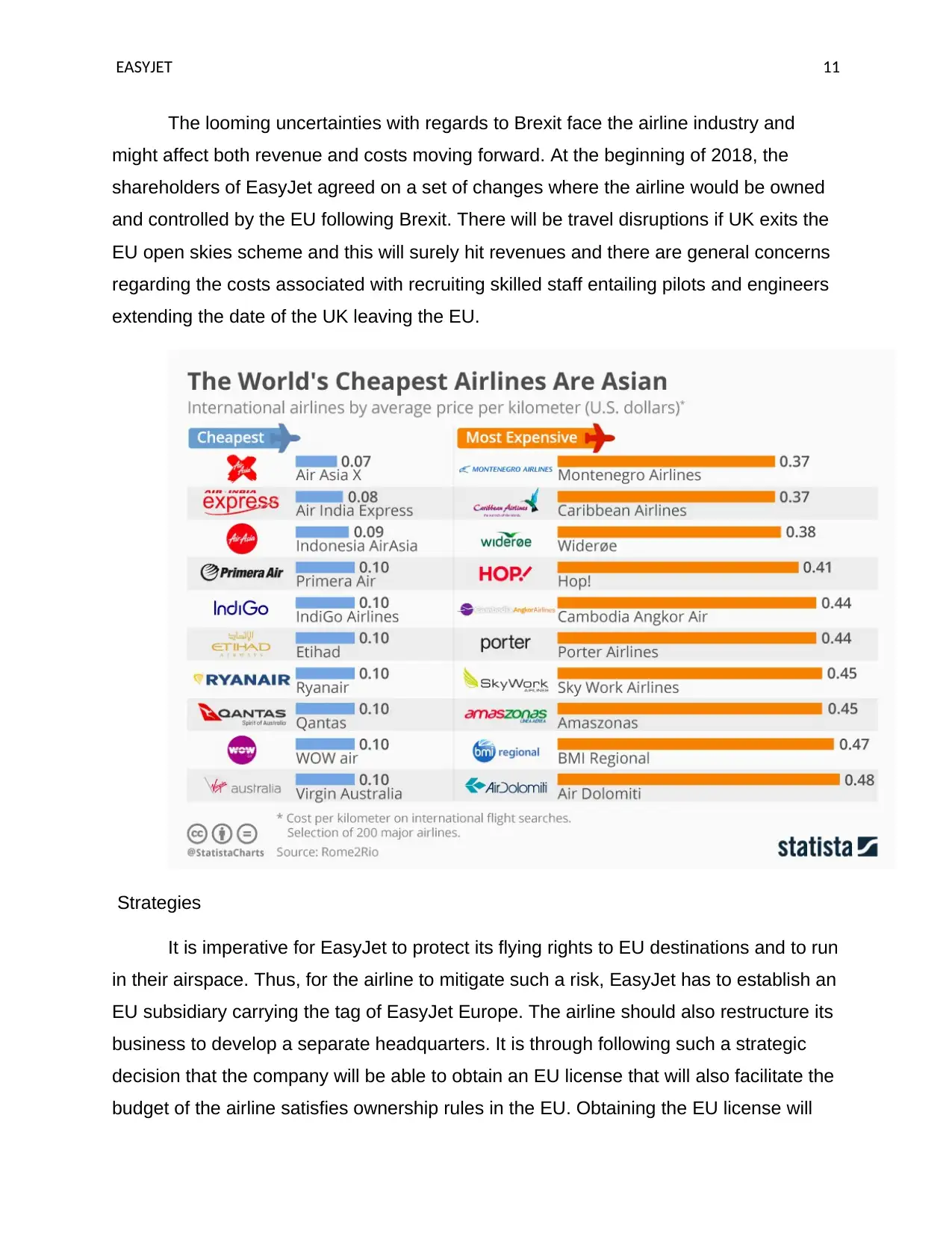
EASYJET 11
The looming uncertainties with regards to Brexit face the airline industry and
might affect both revenue and costs moving forward. At the beginning of 2018, the
shareholders of EasyJet agreed on a set of changes where the airline would be owned
and controlled by the EU following Brexit. There will be travel disruptions if UK exits the
EU open skies scheme and this will surely hit revenues and there are general concerns
regarding the costs associated with recruiting skilled staff entailing pilots and engineers
extending the date of the UK leaving the EU.
Strategies
It is imperative for EasyJet to protect its flying rights to EU destinations and to run
in their airspace. Thus, for the airline to mitigate such a risk, EasyJet has to establish an
EU subsidiary carrying the tag of EasyJet Europe. The airline should also restructure its
business to develop a separate headquarters. It is through following such a strategic
decision that the company will be able to obtain an EU license that will also facilitate the
budget of the airline satisfies ownership rules in the EU. Obtaining the EU license will
The looming uncertainties with regards to Brexit face the airline industry and
might affect both revenue and costs moving forward. At the beginning of 2018, the
shareholders of EasyJet agreed on a set of changes where the airline would be owned
and controlled by the EU following Brexit. There will be travel disruptions if UK exits the
EU open skies scheme and this will surely hit revenues and there are general concerns
regarding the costs associated with recruiting skilled staff entailing pilots and engineers
extending the date of the UK leaving the EU.
Strategies
It is imperative for EasyJet to protect its flying rights to EU destinations and to run
in their airspace. Thus, for the airline to mitigate such a risk, EasyJet has to establish an
EU subsidiary carrying the tag of EasyJet Europe. The airline should also restructure its
business to develop a separate headquarters. It is through following such a strategic
decision that the company will be able to obtain an EU license that will also facilitate the
budget of the airline satisfies ownership rules in the EU. Obtaining the EU license will
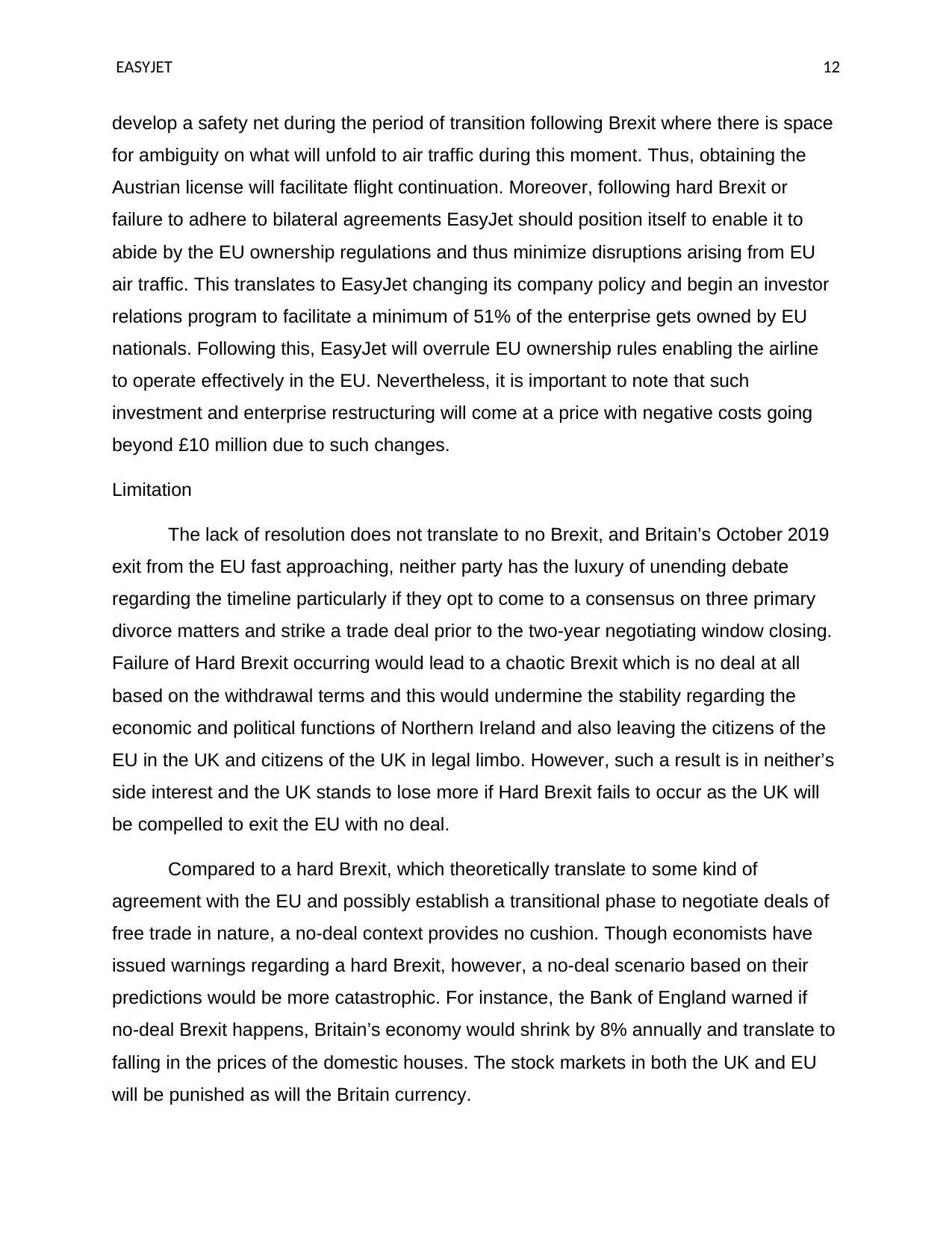
EASYJET 12
develop a safety net during the period of transition following Brexit where there is space
for ambiguity on what will unfold to air traffic during this moment. Thus, obtaining the
Austrian license will facilitate flight continuation. Moreover, following hard Brexit or
failure to adhere to bilateral agreements EasyJet should position itself to enable it to
abide by the EU ownership regulations and thus minimize disruptions arising from EU
air traffic. This translates to EasyJet changing its company policy and begin an investor
relations program to facilitate a minimum of 51% of the enterprise gets owned by EU
nationals. Following this, EasyJet will overrule EU ownership rules enabling the airline
to operate effectively in the EU. Nevertheless, it is important to note that such
investment and enterprise restructuring will come at a price with negative costs going
beyond £10 million due to such changes.
Limitation
The lack of resolution does not translate to no Brexit, and Britain’s October 2019
exit from the EU fast approaching, neither party has the luxury of unending debate
regarding the timeline particularly if they opt to come to a consensus on three primary
divorce matters and strike a trade deal prior to the two-year negotiating window closing.
Failure of Hard Brexit occurring would lead to a chaotic Brexit which is no deal at all
based on the withdrawal terms and this would undermine the stability regarding the
economic and political functions of Northern Ireland and also leaving the citizens of the
EU in the UK and citizens of the UK in legal limbo. However, such a result is in neither’s
side interest and the UK stands to lose more if Hard Brexit fails to occur as the UK will
be compelled to exit the EU with no deal.
Compared to a hard Brexit, which theoretically translate to some kind of
agreement with the EU and possibly establish a transitional phase to negotiate deals of
free trade in nature, a no-deal context provides no cushion. Though economists have
issued warnings regarding a hard Brexit, however, a no-deal scenario based on their
predictions would be more catastrophic. For instance, the Bank of England warned if
no-deal Brexit happens, Britain’s economy would shrink by 8% annually and translate to
falling in the prices of the domestic houses. The stock markets in both the UK and EU
will be punished as will the Britain currency.
develop a safety net during the period of transition following Brexit where there is space
for ambiguity on what will unfold to air traffic during this moment. Thus, obtaining the
Austrian license will facilitate flight continuation. Moreover, following hard Brexit or
failure to adhere to bilateral agreements EasyJet should position itself to enable it to
abide by the EU ownership regulations and thus minimize disruptions arising from EU
air traffic. This translates to EasyJet changing its company policy and begin an investor
relations program to facilitate a minimum of 51% of the enterprise gets owned by EU
nationals. Following this, EasyJet will overrule EU ownership rules enabling the airline
to operate effectively in the EU. Nevertheless, it is important to note that such
investment and enterprise restructuring will come at a price with negative costs going
beyond £10 million due to such changes.
Limitation
The lack of resolution does not translate to no Brexit, and Britain’s October 2019
exit from the EU fast approaching, neither party has the luxury of unending debate
regarding the timeline particularly if they opt to come to a consensus on three primary
divorce matters and strike a trade deal prior to the two-year negotiating window closing.
Failure of Hard Brexit occurring would lead to a chaotic Brexit which is no deal at all
based on the withdrawal terms and this would undermine the stability regarding the
economic and political functions of Northern Ireland and also leaving the citizens of the
EU in the UK and citizens of the UK in legal limbo. However, such a result is in neither’s
side interest and the UK stands to lose more if Hard Brexit fails to occur as the UK will
be compelled to exit the EU with no deal.
Compared to a hard Brexit, which theoretically translate to some kind of
agreement with the EU and possibly establish a transitional phase to negotiate deals of
free trade in nature, a no-deal context provides no cushion. Though economists have
issued warnings regarding a hard Brexit, however, a no-deal scenario based on their
predictions would be more catastrophic. For instance, the Bank of England warned if
no-deal Brexit happens, Britain’s economy would shrink by 8% annually and translate to
falling in the prices of the domestic houses. The stock markets in both the UK and EU
will be punished as will the Britain currency.
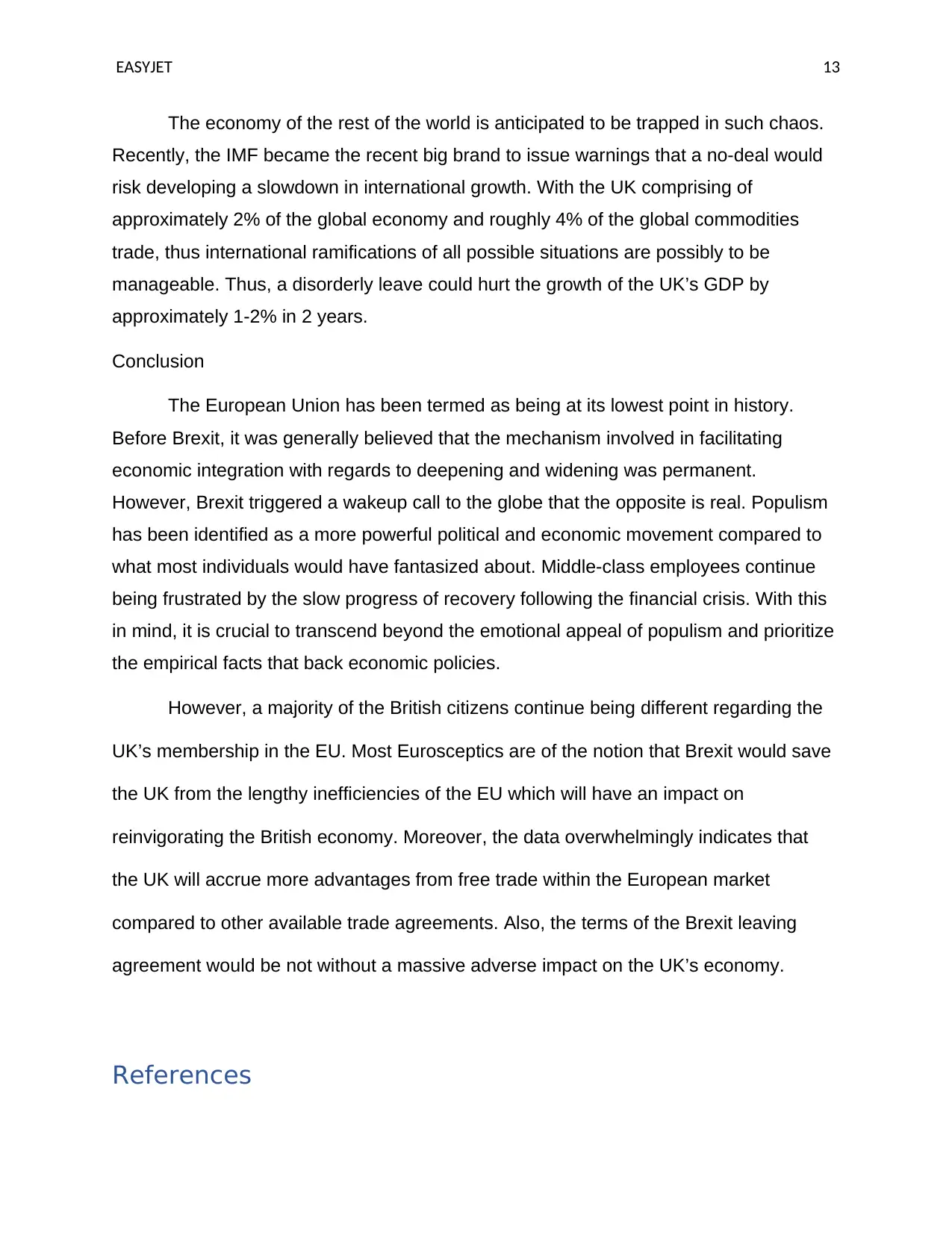
EASYJET 13
The economy of the rest of the world is anticipated to be trapped in such chaos.
Recently, the IMF became the recent big brand to issue warnings that a no-deal would
risk developing a slowdown in international growth. With the UK comprising of
approximately 2% of the global economy and roughly 4% of the global commodities
trade, thus international ramifications of all possible situations are possibly to be
manageable. Thus, a disorderly leave could hurt the growth of the UK’s GDP by
approximately 1-2% in 2 years.
Conclusion
The European Union has been termed as being at its lowest point in history.
Before Brexit, it was generally believed that the mechanism involved in facilitating
economic integration with regards to deepening and widening was permanent.
However, Brexit triggered a wakeup call to the globe that the opposite is real. Populism
has been identified as a more powerful political and economic movement compared to
what most individuals would have fantasized about. Middle-class employees continue
being frustrated by the slow progress of recovery following the financial crisis. With this
in mind, it is crucial to transcend beyond the emotional appeal of populism and prioritize
the empirical facts that back economic policies.
However, a majority of the British citizens continue being different regarding the
UK’s membership in the EU. Most Eurosceptics are of the notion that Brexit would save
the UK from the lengthy inefficiencies of the EU which will have an impact on
reinvigorating the British economy. Moreover, the data overwhelmingly indicates that
the UK will accrue more advantages from free trade within the European market
compared to other available trade agreements. Also, the terms of the Brexit leaving
agreement would be not without a massive adverse impact on the UK’s economy.
References
The economy of the rest of the world is anticipated to be trapped in such chaos.
Recently, the IMF became the recent big brand to issue warnings that a no-deal would
risk developing a slowdown in international growth. With the UK comprising of
approximately 2% of the global economy and roughly 4% of the global commodities
trade, thus international ramifications of all possible situations are possibly to be
manageable. Thus, a disorderly leave could hurt the growth of the UK’s GDP by
approximately 1-2% in 2 years.
Conclusion
The European Union has been termed as being at its lowest point in history.
Before Brexit, it was generally believed that the mechanism involved in facilitating
economic integration with regards to deepening and widening was permanent.
However, Brexit triggered a wakeup call to the globe that the opposite is real. Populism
has been identified as a more powerful political and economic movement compared to
what most individuals would have fantasized about. Middle-class employees continue
being frustrated by the slow progress of recovery following the financial crisis. With this
in mind, it is crucial to transcend beyond the emotional appeal of populism and prioritize
the empirical facts that back economic policies.
However, a majority of the British citizens continue being different regarding the
UK’s membership in the EU. Most Eurosceptics are of the notion that Brexit would save
the UK from the lengthy inefficiencies of the EU which will have an impact on
reinvigorating the British economy. Moreover, the data overwhelmingly indicates that
the UK will accrue more advantages from free trade within the European market
compared to other available trade agreements. Also, the terms of the Brexit leaving
agreement would be not without a massive adverse impact on the UK’s economy.
References
Paraphrase This Document
Need a fresh take? Get an instant paraphrase of this document with our AI Paraphraser
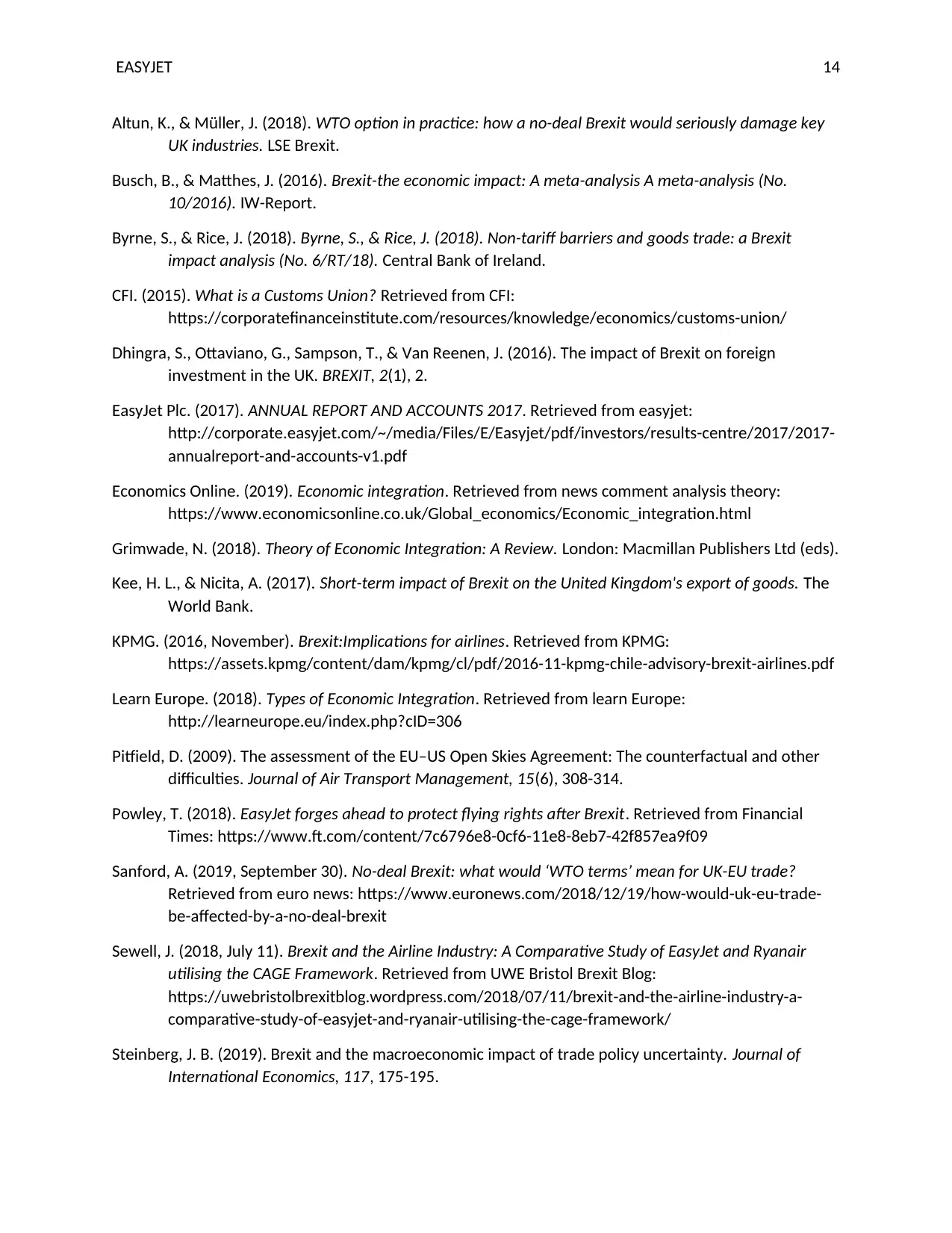
EASYJET 14
Altun, K., & Müller, J. (2018). WTO option in practice: how a no-deal Brexit would seriously damage key
UK industries. LSE Brexit.
Busch, B., & Matthes, J. (2016). Brexit-the economic impact: A meta-analysis A meta-analysis (No.
10/2016). IW-Report.
Byrne, S., & Rice, J. (2018). Byrne, S., & Rice, J. (2018). Non-tariff barriers and goods trade: a Brexit
impact analysis (No. 6/RT/18). Central Bank of Ireland.
CFI. (2015). What is a Customs Union? Retrieved from CFI:
https://corporatefinanceinstitute.com/resources/knowledge/economics/customs-union/
Dhingra, S., Ottaviano, G., Sampson, T., & Van Reenen, J. (2016). The impact of Brexit on foreign
investment in the UK. BREXIT, 2(1), 2.
EasyJet Plc. (2017). ANNUAL REPORT AND ACCOUNTS 2017. Retrieved from easyjet:
http://corporate.easyjet.com/~/media/Files/E/Easyjet/pdf/investors/results-centre/2017/2017-
annualreport-and-accounts-v1.pdf
Economics Online. (2019). Economic integration. Retrieved from news comment analysis theory:
https://www.economicsonline.co.uk/Global_economics/Economic_integration.html
Grimwade, N. (2018). Theory of Economic Integration: A Review. London: Macmillan Publishers Ltd (eds).
Kee, H. L., & Nicita, A. (2017). Short-term impact of Brexit on the United Kingdom's export of goods. The
World Bank.
KPMG. (2016, November). Brexit:Implications for airlines. Retrieved from KPMG:
https://assets.kpmg/content/dam/kpmg/cl/pdf/2016-11-kpmg-chile-advisory-brexit-airlines.pdf
Learn Europe. (2018). Types of Economic Integration. Retrieved from learn Europe:
http://learneurope.eu/index.php?cID=306
Pitfield, D. (2009). The assessment of the EU–US Open Skies Agreement: The counterfactual and other
difficulties. Journal of Air Transport Management, 15(6), 308-314.
Powley, T. (2018). EasyJet forges ahead to protect flying rights after Brexit. Retrieved from Financial
Times: https://www.ft.com/content/7c6796e8-0cf6-11e8-8eb7-42f857ea9f09
Sanford, A. (2019, September 30). No-deal Brexit: what would ‘WTO terms’ mean for UK-EU trade?
Retrieved from euro news: https://www.euronews.com/2018/12/19/how-would-uk-eu-trade-
be-affected-by-a-no-deal-brexit
Sewell, J. (2018, July 11). Brexit and the Airline Industry: A Comparative Study of EasyJet and Ryanair
utilising the CAGE Framework. Retrieved from UWE Bristol Brexit Blog:
https://uwebristolbrexitblog.wordpress.com/2018/07/11/brexit-and-the-airline-industry-a-
comparative-study-of-easyjet-and-ryanair-utilising-the-cage-framework/
Steinberg, J. B. (2019). Brexit and the macroeconomic impact of trade policy uncertainty. Journal of
International Economics, 117, 175-195.
Altun, K., & Müller, J. (2018). WTO option in practice: how a no-deal Brexit would seriously damage key
UK industries. LSE Brexit.
Busch, B., & Matthes, J. (2016). Brexit-the economic impact: A meta-analysis A meta-analysis (No.
10/2016). IW-Report.
Byrne, S., & Rice, J. (2018). Byrne, S., & Rice, J. (2018). Non-tariff barriers and goods trade: a Brexit
impact analysis (No. 6/RT/18). Central Bank of Ireland.
CFI. (2015). What is a Customs Union? Retrieved from CFI:
https://corporatefinanceinstitute.com/resources/knowledge/economics/customs-union/
Dhingra, S., Ottaviano, G., Sampson, T., & Van Reenen, J. (2016). The impact of Brexit on foreign
investment in the UK. BREXIT, 2(1), 2.
EasyJet Plc. (2017). ANNUAL REPORT AND ACCOUNTS 2017. Retrieved from easyjet:
http://corporate.easyjet.com/~/media/Files/E/Easyjet/pdf/investors/results-centre/2017/2017-
annualreport-and-accounts-v1.pdf
Economics Online. (2019). Economic integration. Retrieved from news comment analysis theory:
https://www.economicsonline.co.uk/Global_economics/Economic_integration.html
Grimwade, N. (2018). Theory of Economic Integration: A Review. London: Macmillan Publishers Ltd (eds).
Kee, H. L., & Nicita, A. (2017). Short-term impact of Brexit on the United Kingdom's export of goods. The
World Bank.
KPMG. (2016, November). Brexit:Implications for airlines. Retrieved from KPMG:
https://assets.kpmg/content/dam/kpmg/cl/pdf/2016-11-kpmg-chile-advisory-brexit-airlines.pdf
Learn Europe. (2018). Types of Economic Integration. Retrieved from learn Europe:
http://learneurope.eu/index.php?cID=306
Pitfield, D. (2009). The assessment of the EU–US Open Skies Agreement: The counterfactual and other
difficulties. Journal of Air Transport Management, 15(6), 308-314.
Powley, T. (2018). EasyJet forges ahead to protect flying rights after Brexit. Retrieved from Financial
Times: https://www.ft.com/content/7c6796e8-0cf6-11e8-8eb7-42f857ea9f09
Sanford, A. (2019, September 30). No-deal Brexit: what would ‘WTO terms’ mean for UK-EU trade?
Retrieved from euro news: https://www.euronews.com/2018/12/19/how-would-uk-eu-trade-
be-affected-by-a-no-deal-brexit
Sewell, J. (2018, July 11). Brexit and the Airline Industry: A Comparative Study of EasyJet and Ryanair
utilising the CAGE Framework. Retrieved from UWE Bristol Brexit Blog:
https://uwebristolbrexitblog.wordpress.com/2018/07/11/brexit-and-the-airline-industry-a-
comparative-study-of-easyjet-and-ryanair-utilising-the-cage-framework/
Steinberg, J. B. (2019). Brexit and the macroeconomic impact of trade policy uncertainty. Journal of
International Economics, 117, 175-195.
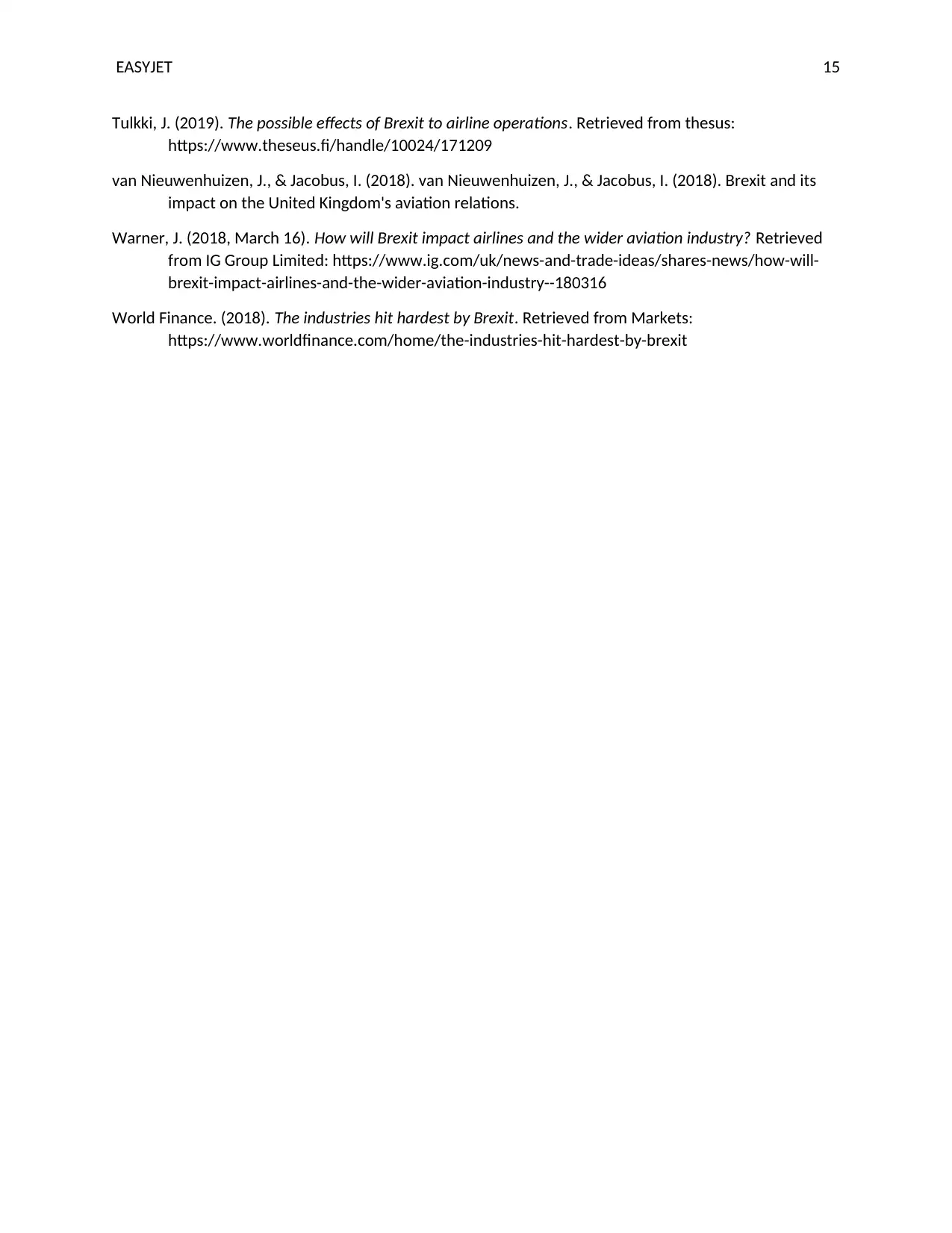
EASYJET 15
Tulkki, J. (2019). The possible effects of Brexit to airline operations. Retrieved from thesus:
https://www.theseus.fi/handle/10024/171209
van Nieuwenhuizen, J., & Jacobus, I. (2018). van Nieuwenhuizen, J., & Jacobus, I. (2018). Brexit and its
impact on the United Kingdom's aviation relations.
Warner, J. (2018, March 16). How will Brexit impact airlines and the wider aviation industry? Retrieved
from IG Group Limited: https://www.ig.com/uk/news-and-trade-ideas/shares-news/how-will-
brexit-impact-airlines-and-the-wider-aviation-industry--180316
World Finance. (2018). The industries hit hardest by Brexit. Retrieved from Markets:
https://www.worldfinance.com/home/the-industries-hit-hardest-by-brexit
Tulkki, J. (2019). The possible effects of Brexit to airline operations. Retrieved from thesus:
https://www.theseus.fi/handle/10024/171209
van Nieuwenhuizen, J., & Jacobus, I. (2018). van Nieuwenhuizen, J., & Jacobus, I. (2018). Brexit and its
impact on the United Kingdom's aviation relations.
Warner, J. (2018, March 16). How will Brexit impact airlines and the wider aviation industry? Retrieved
from IG Group Limited: https://www.ig.com/uk/news-and-trade-ideas/shares-news/how-will-
brexit-impact-airlines-and-the-wider-aviation-industry--180316
World Finance. (2018). The industries hit hardest by Brexit. Retrieved from Markets:
https://www.worldfinance.com/home/the-industries-hit-hardest-by-brexit
1 out of 15
Related Documents
Your All-in-One AI-Powered Toolkit for Academic Success.
+13062052269
info@desklib.com
Available 24*7 on WhatsApp / Email
![[object Object]](/_next/static/media/star-bottom.7253800d.svg)
Unlock your academic potential
© 2024 | Zucol Services PVT LTD | All rights reserved.




